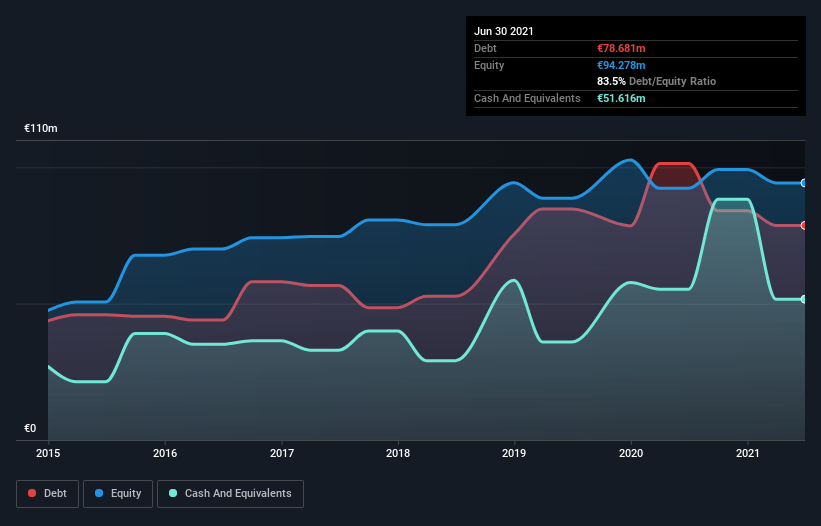Some say volatility, rather than debt, is the best way to think about risk as an investor, but Warren Buffett famously said that 'Volatility is far from synonymous with risk.' It's only natural to consider a company's balance sheet when you examine how risky it is, since debt is often involved when a business collapses. Importantly, Jacques Bogart S.A. (EPA:JBOG) does carry debt. But the real question is whether this debt is making the company risky.
When Is Debt Dangerous?
Debt and other liabilities become risky for a business when it cannot easily fulfill those obligations, either with free cash flow or by raising capital at an attractive price. In the worst case scenario, a company can go bankrupt if it cannot pay its creditors. However, a more usual (but still expensive) situation is where a company must dilute shareholders at a cheap share price simply to get debt under control. Of course, the upside of debt is that it often represents cheap capital, especially when it replaces dilution in a company with the ability to reinvest at high rates of return. When we think about a company's use of debt, we first look at cash and debt together.
View our latest analysis for Jacques Bogart
How Much Debt Does Jacques Bogart Carry?
You can click the graphic below for the historical numbers, but it shows that Jacques Bogart had €78.7m of debt in June 2021, down from €101.4m, one year before. However, because it has a cash reserve of €51.6m, its net debt is less, at about €27.1m.

A Look At Jacques Bogart's Liabilities
The latest balance sheet data shows that Jacques Bogart had liabilities of €121.5m due within a year, and liabilities of €152.7m falling due after that. Offsetting this, it had €51.6m in cash and €27.4m in receivables that were due within 12 months. So it has liabilities totalling €195.2m more than its cash and near-term receivables, combined.
Given this deficit is actually higher than the company's market capitalization of €176.4m, we think shareholders really should watch Jacques Bogart's debt levels, like a parent watching their child ride a bike for the first time. In the scenario where the company had to clean up its balance sheet quickly, it seems likely shareholders would suffer extensive dilution. The balance sheet is clearly the area to focus on when you are analysing debt. But it is Jacques Bogart's earnings that will influence how the balance sheet holds up in the future. So if you're keen to discover more about its earnings, it might be worth checking out this graph of its long term earnings trend.
Over 12 months, Jacques Bogart made a loss at the EBIT level, and saw its revenue drop to €231m, which is a fall of 11%. We would much prefer see growth.
Caveat Emptor
Not only did Jacques Bogart's revenue slip over the last twelve months, but it also produced negative earnings before interest and tax (EBIT). Indeed, it lost €4.9m at the EBIT level. When we look at that alongside the significant liabilities, we're not particularly confident about the company. It would need to improve its operations quickly for us to be interested in it. On the bright side, we note that trailing twelve month EBIT is worse than the free cash flow of €48m and the profit of €5.1m. So there is definitely a chance that it can improve things in the next few years. When analysing debt levels, the balance sheet is the obvious place to start. However, not all investment risk resides within the balance sheet - far from it. For instance, we've identified 4 warning signs for Jacques Bogart (1 makes us a bit uncomfortable) you should be aware of.
If, after all that, you're more interested in a fast growing company with a rock-solid balance sheet, then check out our list of net cash growth stocks without delay.
New: Manage All Your Stock Portfolios in One Place
We've created the ultimate portfolio companion for stock investors, and it's free.
• Connect an unlimited number of Portfolios and see your total in one currency
• Be alerted to new Warning Signs or Risks via email or mobile
• Track the Fair Value of your stocks
This article by Simply Wall St is general in nature. We provide commentary based on historical data and analyst forecasts only using an unbiased methodology and our articles are not intended to be financial advice. It does not constitute a recommendation to buy or sell any stock, and does not take account of your objectives, or your financial situation. We aim to bring you long-term focused analysis driven by fundamental data. Note that our analysis may not factor in the latest price-sensitive company announcements or qualitative material. Simply Wall St has no position in any stocks mentioned.
Have feedback on this article? Concerned about the content? Get in touch with us directly. Alternatively, email editorial-team (at) simplywallst.com.
About ENXTPA:JBOG
Jacques Bogart
Designs, produces, and distributes perfumes and cosmetics worldwide.
Moderate risk and good value.
Market Insights
Community Narratives


Recently Updated Narratives


Engineered for Stability. Positioned for Growth.


MINISO's fair value is projected at 26.69 with an anticipated PE ratio shift of 20x


Fiverr International will transform the freelance industry with AI-powered growth
Popular Narratives


MicroVision will explode future revenue by 380.37% with a vision towards success


NVDA: Expanding AI Demand Will Drive Major Data Center Investments Through 2026



